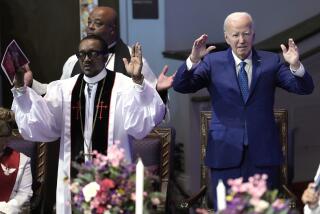Commentary: The story we’re told about ‘evangelicals’ is wrong. ‘The Black Church’ aims to fix that
At least since Orange County coffee klatches and erstwhile Southern strategists swept Ronald Reagan into the White House, consuming political news in this country has meant confronting the seemingly inexorable rise of one “interest group” in particular: evangelical Christians.
Even before the press corps descended on diner counters from Sandy Hook, Ky., to Racine, Wis., in their quest to understand the appeal of Donald Trump, reporters fanned out to Farmingville, N.Y., and Colorado Springs, Colo., in search of the rank-and-file behind such figures as Jerry Falwell, Pat Robertson and President George W. Bush. PBS and U.S. News & World Report polled “America’s evangelicals.” HBO’s “Game Change” attracted criticism for focusing on the blind-item salaciousness of Sarah Palin’s disastrous vice presidential campaign rather than analysis of her appeal to evangelicals. And cable news networks hired movement figures as regular contributors: “A Guide to Christian Ambition” author Hugh Hewitt at MSNBC, former White House Press Secretary Sarah Huckabee Sanders at Fox News.
If the name applied to the phenomenon changed — Moral Majority, culture warriors, values voters, the religious right — 40 years of media coverage nonetheless established it as a coherent and remarkably powerful force, one whose unifying feature was as much demographic as it was doctrinal. In this reckoning, evangelical Christians were conservative, rural and white.
In point of fact — as PBS’ excellent new docuseries “The Black Church: This Is Our Story, This Is Our Song” details — evangelicalism in America predates not only Reagan but also America itself, and from its origins in the itinerant revivalism of colonial Virginia, it has squared space for radical forms of Black-led religious expression, social life and political organization. To erase Black denominations from the popular understanding of evangelical Christianity is to render the institution “invisible” again, as it was in the antebellum South, despite its profound influence. After all, it is Black evangelicalism — often in direct opposition to its white counterpart — that propelled the abolition of slavery and the civil rights revolution, as well as the development of gospel, blues, jazz, even disco.
Premiering Tuesday and continuing with Part 2 on Wednesday, “The Black Church,” hosted, written and executive produced by Harvard scholar Henry Louis Gates Jr., is almost certainly the finest primer on Black religion in the United States to air on television in a generation. (One notable predecessor, 2003’s “This Far by Faith,” is available on Vimeo thanks to producer June Cross.) And while the series marshals both celebrity interviews (Oprah Winfrey, John Legend) and indelible music (the Edwin Hawkins Singers’ “Oh Happy Day”) to support its claim that the church is “the first, longest-lasting and most consequential Black institution in American life,” its foremost strength is its historical backbone.
In “The Good Lord Bird,” Ethan Hawke plays John Brown as an American Cassandra, a misunderstood hero for his time — and our own.
Beginning with the creation of a distinctly African American religion in the crucible of slavery and concluding with the place of faith in the Black Lives Matter movement — plus pit stops for the ring shout and the Asuza Street revival, race records and Black Jesus — to call the four-hour series kaleidoscopic would be to undersell its breadth. Despite its relatively brief engagement with each narrative strand, however, it leaves no doubt in the aggregate that the Black church, as W.E.B. Du Bois had it, forged “a nation within a nation,” one that embraced at varying moments both protest and prosperity, rebellion and respectability.
It’s this arc, particularly as it moves into the 20th century, that marks “The Black Church” as a corrective to the image of “America’s evangelicals” produced by our impoverished political discourse. For all the media attention devoted to the topic in recent years, the average news consumer might be surprised to learn of the megachurch’s origins in the thousands-strong congregations of Chicago’s Mount Olivet and Harlem’s Abyssinian at the height of the Great Migration. Or to hear the 2015 shooting at Emanuel African Methodist Episcopal Church in Charleston, S.C., connected to the 1963 church bombing in Birmingham, Ala., and in turn to the “white backlash” against independent Black churches that followed Reconstruction. Even when it comes to topics that may reflect less than admirably on the institution itself — often adamantly opposed to female preachers, out gay parishioners and gangsta rap — “The Black Church” places the Black experience at the core of the American story, and thereby rewrites it.
It’s a lesson that mainstream media outlets, subsumed in a consistent drumbeat of controversies and mea culpas on issues of race, still need to learn. Although the number of Americans unaffiliated with any religion is on the rise, belief remains a potent source of social, cultural and political currency here, and “evangelicalism” — a word whose very etymology suggests “good news” — has, in many cases, become lazy shorthand not only for white, rural, conservative Protestantism but also for devotion itself.
If the docuseries is an essential counternarrative, then, it is necessarily shadowed by the failures of the dominant one. To hear the Rev. Jeremiah Wright explain the outcry over his infamous “God damn America” sermon, which erupted during the 2008 presidential campaign, is to recognize that what he calls “love this country right or wrong, make America great again” thinking, far from being the province of partisans, has been central to the discussion of “evangelical Christians” for decades.
And as “The Black Church” makes clear, if not quite explicit, the consequence of excluding Black, urban, progressive religion from this discourse — the definition of Black people as faithless, of Black communities as rootless, of Black institutions as powerless, of Black votes as worthless — isn’t merely hypothetical. It never was.
‘The Black Church: This Is Our Story, This Is Our Song’
Where: KOCE (PBS Passport, any time)
When: 9 p.m. Tuesday, Wednesday
Rating: TV-14-L (may be unsuitable for children under age 14 with an advisory for coarse language)
More to Read
The complete guide to home viewing
Get Screen Gab for everything about the TV shows and streaming movies everyone’s talking about.
You may occasionally receive promotional content from the Los Angeles Times.







